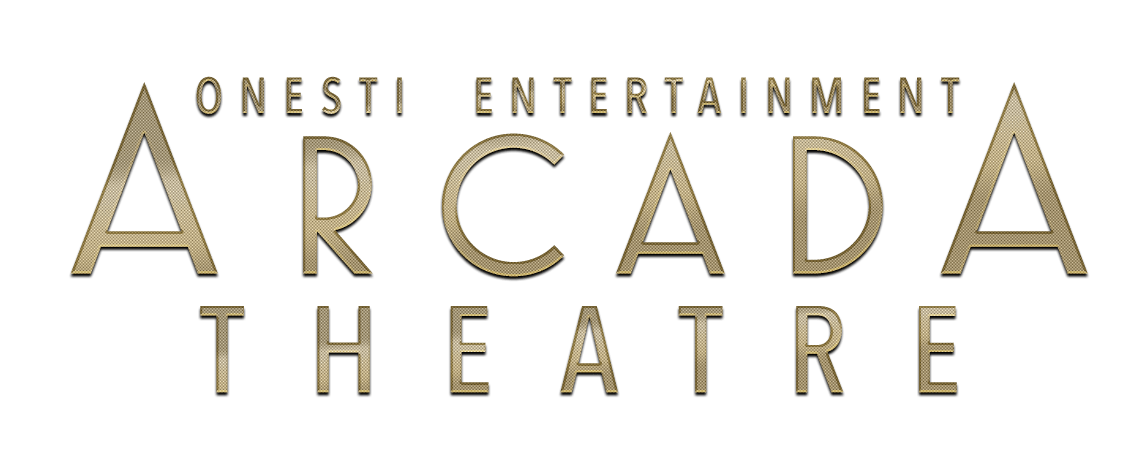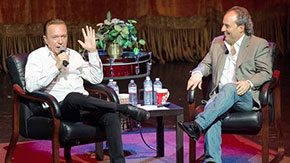It seems every time we turn around, we are losing another showbiz legend, an icon whose music was an integral part of our early years. This week we experienced quite the variety of losses, ranging from guitarist Malcolm Young from the hard rock band AC/DC, to television personality Della Reese, to teen heartthrob David Cassidy.
In my humble world of music and entertainment, I get to meet many of the heroes of my youth. I confess, I am still star-struck a bit when they come by us to play at The Arcada. I just love the music and to hear their backstage stories. These legends become real people, and I get the true (for the most part) stories behind their climb (and sometimes fall) in their respective careers.
I never had the opportunity to meet Malcom Young, who, along with his brother Angus, formed one of the biggest bands in rock history. But I can tell ya, when AC/DC’s seventh album “Back In Black” came out, I was 18 years old, and I air-guitared those stiff opening riffs of the title song from that album better than any of my friends could. And if I didn’t blow out my vocal chords by attempting to hit those loud, high-pitched Brian Johnson-style notes (Johnson replaced original lead singer Bon Scott, who died earlier that year), well, I think they are still sore to this day!
I also never met Della Reese, the “Touched By An Angel” television star who began her career as a vocalist. But I did have the privilege of hosting Motown legend Martha Reeves at The Arcada recently. After spending almost three hours with her after her show as she told her own personal story, she credited Reese as a major influence and said she named her group The Vandellas after Van Dyke Street in Detroit and Della Reese. She also told me something I never knew, that Reese was discovered by the gospel singer Mahalia Jackson, and her real name wasn’t “Della Reese,” but it was “Delloreese Early.”
Then, there was “Keith” from “The Partridge Family,” David Cassidy. I DID have quite a bit of unique experiences with him, albeit not as pleasant, unfortunately. But there were a few pleasantries we exchanged during the two shows I did with him.
The first time I met David, I was instructed to get a day room across the street at the Hotel Baker so that he didn’t have to use our dressing rooms, as a matter of his “safety.” I thought, “Whatever,” and got him the room.
I greeted his limousine as I met him in front of The Baker, only to have him roll down his window half way and ask if there was a rear entrance to the hotel. He then met me at the back door of the hotel kitchen, in a baseball hat, sunglasses and collar-turned-up trench coat (it was the middle of summer), and proceeded to go directly to his room, avoiding the imaginary throngs of fans there to greet him.
He showed up later to his show, entering the backstage door about five minutes before showtime. He was tripping over his words, and seemed “under the influence” of some liquid “confidence builder.”
He did his show, but not without a few uncomfortable moments and exchanges with the audience. He did quite a bit of talking in between songs, more editorial about world affairs and his relationship with John Lennon than heartwarming stories of his years as a teen idol. He did do the hits; many he sang differently than the original recordings, but still, much of the audience was thrilled to have a brush with their teen love.
Yes, it was somewhat of a challenging day. I truly had heartfelt sympathy for the guy because he was definitely experiencing personal struggles. I could see the will to entertain was still in his soul, but his demons got in the way of his ability to unleash the talent he once had.
A few years later, in 2015, his agent phoned me and asked if I wanted to bring him back to The Arcada. I told him flat out that I probably wouldn’t as the previous time was a tough one.
The agent told me that David wanted to return not with his full band show, but as an acoustic, songs and stories kind of a thing. But specifically, he wanted to tell his story about his bouts with alcoholism, of growing up as the son of superstar parents and his experience as an international celebrity in his own right. He really wanted to talk about his “demons.”
We began the day doing press, and he appeared on the WGN Morning News. He sang the “Partridge Family” theme song, “C’mon Get Happy.” Was his song selection ironic, or was there an intended message there?
Then he spoke about songs his father taught him that had a positive influence in his career. “My dad loved Cole Porter,” he said. So, David’s plan was to record a new album of classic standards, even performing the 1932 Porter staple “Night And Day” on the show that morning. He seemed to be having a genuinely good time. But still, his physical presence represented somebody with definite “demons.”
At The Arcada later that night, it was just David, his piano player and me, as I was there to moderate and ask the questions. We created a video montage of pictures that David described as he went along. He got a bit choked up when pictures of his dad, veteran actor Jack Cassidy, came up.
“It was a volatile relationship, and he was a victim of alcoholism,” he said. “But I really loved him, and I truly loved Shirley, even though I had a real mom, too.” He spoke about the relatively constant battles that happened between his father and his stepmother, Shirley Jones, during his teen years.
He then opened up his heart about the challenges he faced battling alcoholism. He cited the pressures of being on top, and even more difficult, staying on top. He was more often than not a lonely guy because of the dependence he had on alcohol, and how that put a huge divider between he and his kids.
He really wanted to be honest with his fans, as he became more honest with himself. He insisted that during the Partridge Family years, he never drank or took any controlled substances, but the pressures after the show’s cancellation is what made him go down that road.
All I could see is this guy who was broken inside, a tragic figure who seemed to have lost it all. And all he really wanted was to regain the trust of his family, and the love of his fans. As I watched him, I felt more and more the pain he was going through. He planned to get better, and was determined to straighten out. But ultimately, it was too late.
Aside from the iconic television show and his wonderful pop music recordings, the David Cassidy story is one of a subject that rises and falls, one filled with drama, and of heartbreak. His pain is over, but the pain felt by the loving fans that never gave up on him will linger on.
As David Cassidy takes his final ride on that yellow school bus, he is finally free of those said “demons.” God bless you, David, and thanks for being a part of my childhood years in front of our first color television.
• Ron Onesti is president and CEO of The Onesti Entertainment Corp. and The Historic Arcada Theatre in St. Charles. Celebrity questions and comments? Email ron@oshows.com.

